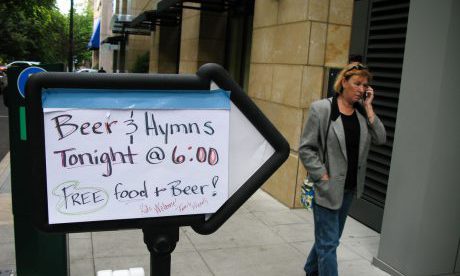The number of Americans who identify as Christians has declined in recent years, from 78.4 percent in 2007 to 70.6 percent in 2014.
That drop-off is most pronounced among young Americans, but it cuts across gender, race, and educational background.
The number of self-proclaimed atheists, agnostics, or “nones” has been steadily rising, increasing from 16 percent to nearly 23 percent in the last seven years.
And yet, America has the largest population of Christians in the world, with some 70 percent of adults saying they ascribe to some branch of the Christian faith.
A study from the Pew Research Center connects these patterns to the overall declines among mainline Protestant and Catholic churches, which some feel is a result of the inability of religious institutions to adapt to a population that has become more diverse and slightly more progressive.
Women, for example, are still prohibited from being ordained in some religious groups, including Mormons, Roman Catholics, and Southern Baptists.
In 2012, only 11 percent of U.S. congregations were woman-led, up from nearly 8 percent in 2007.
I spoke with Jodi Houge, the pastor of Humble Walk Lutheran Church in Saint Paul, Minnesota, about what it is like being a female clergy member, how American churches are adjusting to the decline in religious participation, and how she’s connected with her community by holding services at a coffee shop.
The interview that follows has been lightly edited for length and clarity.
Adrienne Green: What inspired you to become a pastor?
Jodi Houge: I worked at a bible camp the summer after my freshman year of college. I wasn’t thinking, “Oh, yeah, I’d be good at this job.” I just didn’t want to move home. Then, I actually loved it.
I have been a cradle Lutheran Christian, and so this was the first time at age 18 that I had an opportunity to articulate some of those beliefs out loud. I went back the next summer and the one after that. Then I was a college graduate without a plan, and I took another camp job in north Idaho because I wanted to live in the mountains.
That turned into full-time youth work in the church, which I did for 10 years. I thought I would probably do that forever because I loved it so much, even though I felt woefully unprepared theologically. Continue reading
Sources
- The Atlantic, interview by Adrienne Green, an assistant editor at The Atlantic.
- Image: NPR, the Salt
News category: Features.




